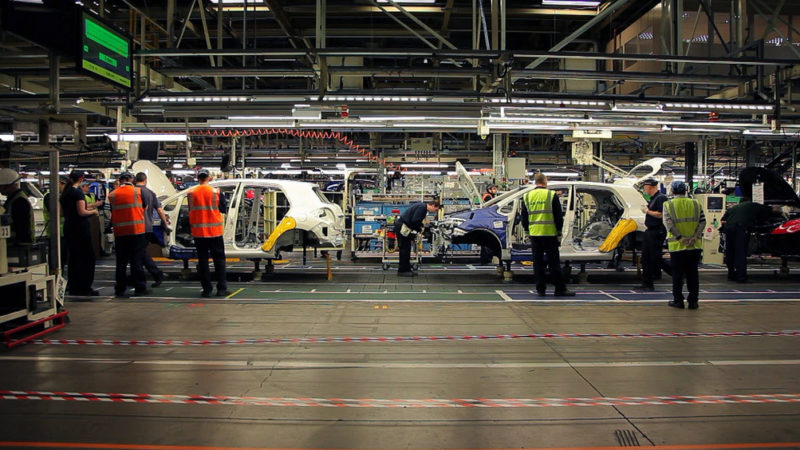If wages are to improve, the UK industrial strategy has to understand local needs and local economies - not just national productivity.

With real household incomes on course to be lower in 2022 than in 2008, and with the last decade having seen a proliferation of problems linked to poor pay and working conditions and insecure work, it is clear that the left needs a transformative agenda for the world of work.
If an incoming Labour government has one fundamental task it will be to take on these problems at root and ensure the availability of good work: well-paid, but also guaranteeing people the voice, autonomy, flexibility and security they want and should be able to expect.
This is not a question of living standards in isolation. The need to ensure sustainable growth in wages is central to any agenda to get us out of our current economic malaise.
For years now, the British economy has depended more and more on ballooning household debt to finance consumption and growth, as wages have stagnated and inequality has widened.
Given that debt has been shown to increase the volatility of our economy and the depth of likely downturns, getting household incomes up is also a question of getting our entire economy onto a firmer footing. The question of household incomes is therefore not simply one of improving living standards, but of creating a stable foundation for the living standards we currently have.
In November 2017, the government published its long awaited industrial strategy White Paper. I was concerned that the industrial strategy had very little to say about the ‘everyday economy’: those essential parts of our economy which are characterised by high levels of employment but also frequently by low pay.
This includes retail, the utilities, health and social care. Significantly, these are also sectors which employ a disproportionate share of Britain’s female workforce. If Labour is to put forward an agenda able to improve living standards for the many, then it must champion an industrial strategy guided first and foremost by what is going on in the everyday economy.
In my chapter for the Fabian Society’s new Raising the Bar report, I set out what this would look like.
Furthermore, to improve wages, the UK industrial strategy will need to have a sensitivity to place – understanding local needs and local economies.
There is a strong correlation in Britain between levels of pay and productivity, on the one hand, and geography, on the other. National government can play a part in ensuring that investment in infrastructure and public services is spread more equally across the country. However, powerful, local democratic institutions must be an absolutely essential part of any strategy which seeks to address stagnant family incomes in many struggling parts of the country.
Preston City Council, working with the Manchester-based Centre for Local Economic Strategies, have set a powerful example by working with local ‘anchor institutions’ to strengthen their local economy.
These institutions – like universities, schools, hospitals and large businesses with roots in the community – are key because they are large employers who spend a large amount on procurement with their supply chain, and because they are unlikely to relocate due to historic ties and relationships in the local area.
In Preston, the council has worked with these institutions to maximise the amount they spend on procurement in the local community, boosting local small businesses and even supporting the creation of local cooperatives. Equally, there is immense potential for local government and anchor institutions to forge living wage deals to drive up pay in an area.
A unit for local wealth building, located at the heart of government, could be charged with building local capacity and organising the cross-departmental collaboration necessary for its implementation. Regional banks would also be key to this agenda of empowering autonomous institutions able to collaborate for the kind of inclusive, local wealth building we need.
It is important for Labour to not just improve wages in the short term, but to entrench a fairer settlement around workers’ wages and conditions for the long term. That means we require a strong, autonomous institutional infrastructure able to withstand a hostile Conservative government. The GMB union is already doing good work, fighting for Uber drivers and others in the platform economy in court, while Community has set a promising example by supporting shared workspaces and offering a range of logistical support for the self-employed.
And as the shadow chancellor John McDonnell has argued, Labour in central and local government should be championing alternative models of ownership, which can guarantee workers not only greater say over decisions made in their workplace, but also a greater share of the profits.
The introduction of the minimum wage and tax credits were some of the proudest achievements of the last Labour government. Protecting them both – and universal credit – from Tory cuts is hugely important.
But incomes cannot be raised by the state alone, and a key test for Labour at all levels of government will be in our willingness to give power away and our ability to collaborate with, and empower, other stakeholders and institutions to create the conditions for higher incomes and a fairer distribution of wealth and power.
Rachel Reeves MP is chair of the Business, Energy and Industrial Strategy Select Committee.
To reach hundreds of thousands of new readers we need to grow our donor base substantially.
That's why in 2024, we are seeking to generate 150 additional regular donors to support Left Foot Forward's work.
We still need another 117 people to donate to hit the target. You can help. Donate today.



